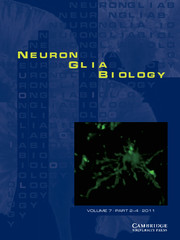Crossref Citations
This article has been cited by the following publications. This list is generated based on data provided by
Crossref.
Li, Wenbo
Zhang, Bin
Tang, Junhong
Cao, Qiong
Wu, Yajun
Wu, Chun
Guo, Jing
Ling, Eng-Ang
and
Liang, Fengyi
2007.
Sirtuin 2, a Mammalian Homolog of Yeast Silent Information Regulator-2 Longevity Regulator, Is an Oligodendroglial Protein That Decelerates Cell Differentiation through Deacetylating α-Tubulin.
The Journal of Neuroscience,
Vol. 27,
Issue. 10,
p.
2606.
Krämer‐Albers, Eva‐Maria
Bretz, Niko
Tenzer, Stefan
Winterstein, Christine
Möbius, Wiebke
Berger, Hendrik
Nave, Klaus‐Armin
Schild, Hansjörg
and
Trotter, Jacqueline
2007.
Oligodendrocytes secrete exosomes containing major myelin and stress‐protective proteins: Trophic support for axons?.
PROTEOMICS – Clinical Applications,
Vol. 1,
Issue. 11,
p.
1446.
Ishii, Akihiro
Ikenaka, Kazuhiro
and
Pfeiffer, Steven E.
2007.
The N‐glycan profile of mouse myelin, a specialized central nervous system membrane.
Journal of Neurochemistry,
Vol. 103,
Issue. s1,
p.
25.
Werner, Hauke B.
Kuhlmann, Katja
Shen, Siming
Uecker, Marina
Schardt, Anke
Dimova, Kalina
Orfaniotou, Foteini
Dhaunchak, Ajit
Brinkmann, Bastian G.
Möbius, Wiebke
Guarente, Lenny
Casaccia-Bonnefil, Patrizia
Jahn, Olaf
and
Nave, Klaus-Armin
2007.
Proteolipid Protein Is Required for Transport of Sirtuin 2 into CNS Myelin.
The Journal of Neuroscience,
Vol. 27,
Issue. 29,
p.
7717.
Gould, Robert M.
Oakley, Todd
Goldstone, Jared V.
Dugas, Jason C.
Brady, Scott T.
and
Gow, Alexander
2008.
Myelin sheaths are formed with proteins that originated in vertebrate lineages.
Neuron Glia Biology,
Vol. 4,
Issue. 2,
p.
137.
Möbius, Wiebke
Patzig, Julia
Nave, Klaus-Armin
and
Werner, Hauke B.
2008.
Phylogeny of proteolipid proteins: divergence, constraints, and the evolution of novel functions in myelination and neuroprotection.
Neuron Glia Biology,
Vol. 4,
Issue. 2,
p.
111.
Ishii, Akihiro
Dutta, Ranjan
Wark, Greg M.
Hwang, Sun-Il
Han, David K.
Trapp, Bruce D.
Pfeiffer, Steven E.
and
Bansal, Rashmi
2009.
Human myelin proteome and comparative analysis with mouse myelin.
Proceedings of the National Academy of Sciences,
Vol. 106,
Issue. 34,
p.
14605.
Ogawa, Yasuhiro
and
Rasband, Matthew N.
2009.
Proteomic analysis of optic nerve lipid rafts reveals new paranodal proteins.
Journal of Neuroscience Research,
Vol. 87,
Issue. 15,
p.
3502.
Buser, A.M.
Erne, B.
Werner, H.B.
Nave, K.-A.
and
Schaeren-Wiemers, N.
2009.
The septin cytoskeleton in myelinating glia.
Molecular and Cellular Neuroscience,
Vol. 40,
Issue. 2,
p.
156.
Jahn, Olaf
Tenzer, Stefan
and
Werner, Hauke B.
2009.
Myelin Proteomics: Molecular Anatomy of an Insulating Sheath.
Molecular Neurobiology,
Vol. 40,
Issue. 1,
p.
55.
Fewou, Simon Ngamli
Fernandes, Alda
Stockdale, Katie
Francone, Victor P.
Dupree, Jeffrey L.
Rosenbluth, Jack
Pfeiffer, Steven E.
and
Bansal, Rashmi
2010.
Myelin protein composition is altered in mice lacking either sulfated or both sulfated and non‐sulfated galactolipids.
Journal of Neurochemistry,
Vol. 112,
Issue. 3,
p.
599.
Mikkat, Stefan
Lorenz, Peter
Scharf, Christian
Yu, Xinhua
Glocker, Michael O.
and
Ibrahim, Saleh M.
2010.
MS characterization of qualitative protein polymorphisms in the spinal cords of inbred mouse strains.
PROTEOMICS,
Vol. 10,
Issue. 5,
p.
1050.
Werner, Hauke B
and
Jahn, Olaf
2010.
Myelin matters: proteomic insights into white matter disorders.
Expert Review of Proteomics,
Vol. 7,
Issue. 2,
p.
159.
Dhaunchak, Ajit S.
Huang, Jeffrey K.
De Faria, Omar
Roth, Alejandro D.
Pedraza, Liliana
Antel, Jack P.
Bar‐Or, Amit
and
Colman, David R.
2010.
A proteome map of axoglial specializations isolated and purified from human central nervous system.
Glia,
Vol. 58,
Issue. 16,
p.
1949.
Barrie, Jennifer A.
Montague, Paul
Karim, Saadia
Kirkham, Douglas
Nave, Klaus‐Armin
Anderson, Thomas J.
Griffiths, Ian R.
and
McLaughlin, Mark
2010.
Modulation of rumpshaker phenotype with wild‐type PLP/DM20 suggests several pathogenic mechanisms.
Journal of Neuroscience Research,
Vol. 88,
Issue. 10,
p.
2135.
Patzig, Julia
Jahn, Olaf
Tenzer, Stefan
Wichert, Sven P.
de Monasterio-Schrader, Patricia
Rosfa, Susanne
Kuharev, Jörg
Yan, Kuo
Bormuth, Ingo
Bremer, Juliane
Aguzzi, Adriano
Orfaniotou, Foteini
Hesse, Dörte
Schwab, Markus H.
Möbius, Wiebke
Nave, Klaus-Armin
and
Werner, Hauke Bernhard
2011.
Quantitative and Integrative Proteome Analysis of Peripheral Nerve Myelin Identifies Novel Myelin Proteins and Candidate Neuropathy Loci.
The Journal of Neuroscience,
Vol. 31,
Issue. 45,
p.
16369.
Zhu, H.
Zhao, L.
Wang, E.
Dimova, N.
Liu, G.
Feng, Y.
and
Cambi, F.
2012.
The QKI‐PLP pathway controls SIRT2 abundance in CNS myelin.
Glia,
Vol. 60,
Issue. 1,
p.
69.
de Monasterio-Schrader, Patricia
Jahn, Olaf
Tenzer, Stefan
Wichert, Sven P.
Patzig, Julia
and
Werner, Hauke B.
2012.
Systematic approaches to central nervous system myelin.
Cellular and Molecular Life Sciences,
Vol. 69,
Issue. 17,
p.
2879.
Gopalakrishnan, Gopakumar
Awasthi, Anshul
Belkaid, Wiam
De Faria, Omar
Liazoghli, Dalinda
Colman, David R.
and
Dhaunchak, Ajit S.
2013.
Lipidome and proteome map of myelin membranes.
Journal of Neuroscience Research,
Vol. 91,
Issue. 3,
p.
321.
Jahn, Olaf
Tenzer, Stefan
Bartsch, Nicole
Patzig, Julia
and
Werner, Hauke B.
2013.
The Cytoskeleton.
Vol. 79,
Issue. ,
p.
335.


